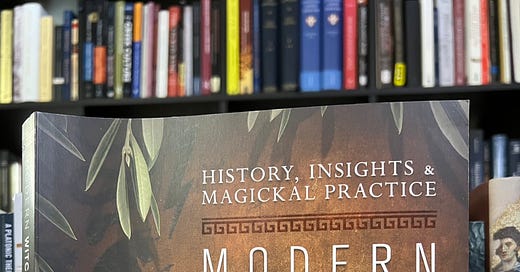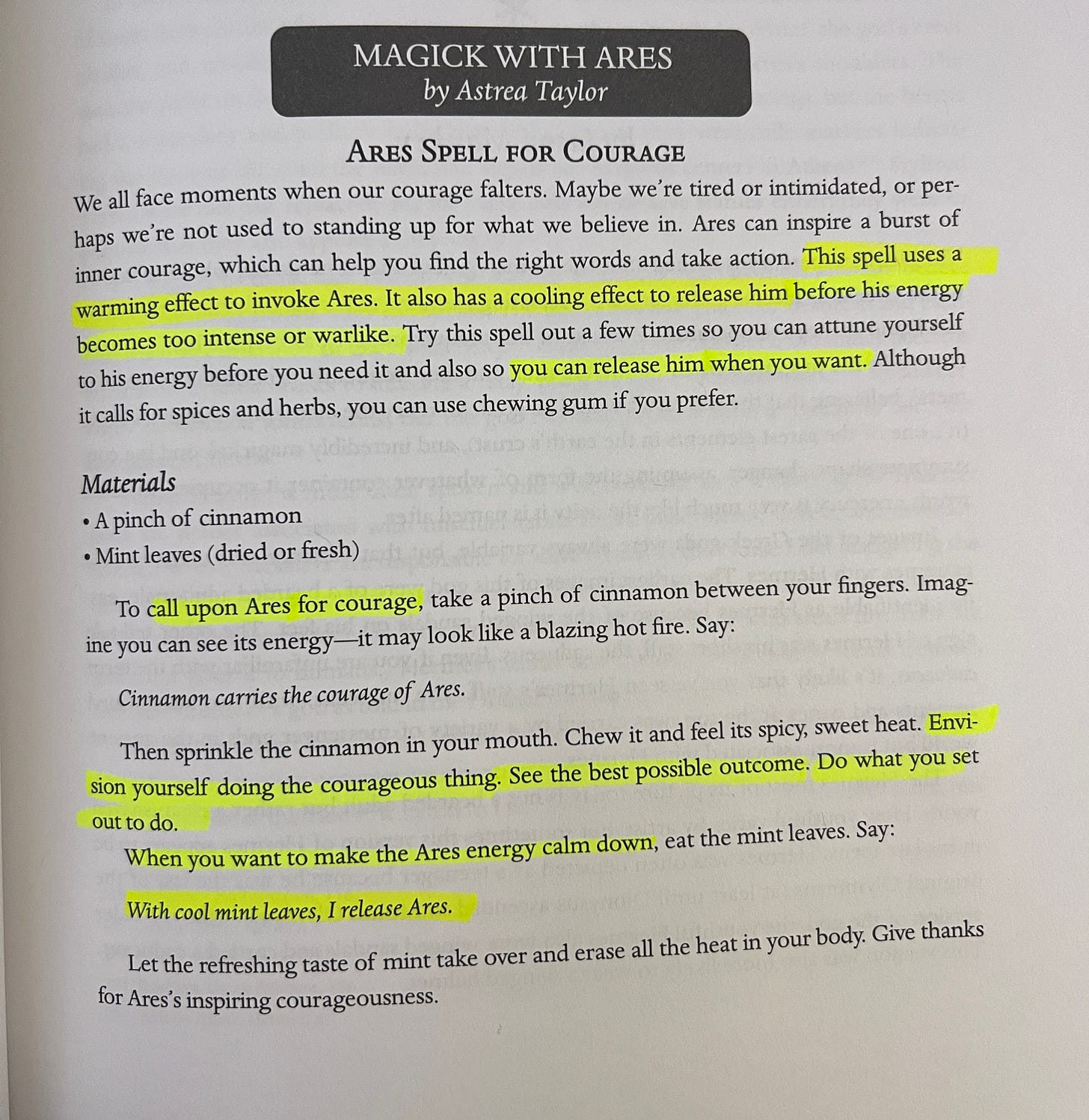Part 1 - Review of Modern Witchcraft with the Greek Gods: History, Insights & Magickal Practice by Jason Mankey & Astrea Taylor
This review contributes toward understanding how Pagans and Witches use scholarship to create their religions, as noted by classicist Sarah Iles Johnston.
This review of Modern Witchcraft with the Greek Gods by Jason Mankey and Astrea Taylor aims to evaluate the book's historical accuracy. Llewelyn has been steadily publishing books with problematic Greek themes; see my last critical review, "The Secret Texts of Hellenic Polytheism" by John Opsopaus; I have felt a need to review their books that relate to anything Greek and ancient religious history since the last book by Opsopaus was a historical nightmare of anachronism and appropriation.
While this book's main topic is witchcraft, the inclusion of 'history' in the title and the historical content within warrants a close and critical examination. Publishers like Llewelyn owe it to their customers to ensure that their authors are credentialed to write about religious history or at least have their books evaluated by someone credentialed who understands the topic's complexities before publication.
The ripple effect of misinformation from pagan books is real. Since the authors cite scholarship, those citations lend a certain credibility to the authors but using scholarship without training can lead to mishandling of sources. As we will see in this post.
I will refrain from commenting on the quality of the book's magick (good or bad) since I am not a witch and not qualified to critique the authors on that front. I aim to stick to the facts, point out inaccuracies, identify the misuse of sources, and/or expound on reductive conclusions or premises made by the author throughout this series of reviews.
Critical reviews of Pagan/Witch-oriented books that draw on scholarship are needed. Speaking to her peers, classicist Sarah Iles Johnston, in Whose Gods are These? A Classicist Looks at Neopaganism has said:
…neopagans base their practices and systems of belief not only on the ancient sources but also, and even more directly, on the work of those who study the ancient sources – that is, they create their religions by drawing upon on the scholarship that we produce.
This review contributes toward understanding how Pagans and Witches use and misuse scholarship to create their religions and how Pagan/Witch authors present history in their work.
Introduction: The Allure of the Greek Gods (Taylor)
Within the introduction is a section titled “Ancient Witchcraft, Magick, and Power” – Taylor aims to reconcile modern magickal practices with ancient magic to justify the modern concepts. Taylor writes:
Witchcraft and magickal concepts proliferated in the ancient world, especially in connection with pagan deities. Historians believe the vast majority of ancient Greeks used magickal practices with deity reverence in order to enhance their everyday lives. (citation)
Taylor’s first citation comes from a graduate thesis, From Daimon to Demon: The Evolution of the Demon from Antiquity to Early Christianity, from page 7 in Chapter 2. Magic, Religion, and a Short History of the Daimon. The only text from this page that comes close to relating to Taylor’s “[h]istorians believe the vast majority of ancient Greeks used magickal practices with deity reverence in order to enhance their everyday lives” is “[t]hus this shows that magic was not necessarily some arcane thing inaccessible to most, but was present in everyday life.” (Emphasis my own).
The Problem – Taylor claims that historians “believe the vast majority of ancient Greeks used magickal practices with deity reverence in order to enhance their everyday lives.” However, the citation does not prove this claim. The cited page only claims to demonstrate, through quoting Fritz Graft, that magic was present in everyday life and not inaccessible to most people. The magic in the quotation from Graft mentions voodoo dolls, magic-induced memory loss, and binding spells. No mention of magic in conjunction with deity reverence is made in the citation, nor the claim that these practices aim at “enhancing the everyday lives” of the individual. Perhaps Taylor should have used this citation to explain to the reader the distinctions between magic and religion that scholars have come up with.
Speaking of distinctions, let's talk about Magick and Magickal. Taylor is being anachronistic, that is, applying modern words or ideas onto the past where they don’t exist, when she writes, “ancient Greeks used magickal practices.” Magickal is a modern occult term that originates with Aleister Crowley. It is not a term used in the study of ancient religions. So no, historians would not say “ancient Greeks used magickal practices” because magick and magickal are not terms recognized in ancient history/classical studies. Making this claim and using a citation that does not back up the premise is messy and misleading.
You may think I am being too harsh over one word since in scholarship, magic and magical are used; what is the difference? It is critical to point this out because how Taylor understands what magick is and what the reader thinks magick is in their witchcraft today – should not be projected onto ancient sources and secondary scholarship. Magick for a Witch is not the same as magic for a scholar of ancient religion. For an excellent discussion on magic in the ancient world, see Drawing Down The Moon: Magic in The Ancient Greco-Roman World by Radcliffe G. Edmonds III.
This distinction between magic, which relates to primary sources and secondary scholarship by scholars studying ancient religions, and that of Magick by modern witches is important as we further read what Taylor writes where the terms really begin to blur. “[S]ome people (including some Hellenic Reconstructionists) believe there's no place for magick or Witchcraft with the Greek gods. They say it's excessively prideful to take matters into one's own hands, and magick is an act of defiance against the gods.” (page 3)
Again, the issue is between Taylor’s understanding of magick and the Greek understanding of magic or how academics define magic in contrast to religion. Using the citation used by Taylor, From Daimon to Demon: The Evolution of the Demon from Antiquity to Early Christianity we find:
“…the word from which “magic” derives, magos, was prevalent as a descriptive term as early as the 6th century BCE, and continuing in use throughout the classical era. Magos itself is a word from the “religious language of Persia, where the magos is a priest or religious specialist. In this case, however, the use of the word itself, and the act of performing mageia, came out of the need for the descriptive language to designate “certain ritual and ideological attachments as foreign, unwanted, and dangerous, from inside Greek (or Athenian) religion, not from outside it.” (Fuller, “From Daimon to Demon,” 8-9)
From a Greek view, mageia (magic) is deployed to identify/label practices seen as unwanted from within Greek religion. There is more that can be said; I am being brief. For an in-depth Greek explanation, as taught today, concerning mageia, I recommend the following article, Magic, Ancient Greek Religion, and Orphism, on HellenicGods.org – it is detailed and explains it all perfectly.
When magic is understood both from a Greek view and the academic approach, compared to the author’s use and understanding of magick –we will see major differences. I have yet to see a clear definition of what magick is to Taylor. Whatever Taylor’s understanding of magick is, it makes no sense to justify her magick (a modern term from a different religious system independent from anything related to the ancient Greek religious landscape) with ancient Greek examples; the two are different.
These forced links between modern magick and ancient magic are constructed to validate and legitimatize magick as the same thing as magic and bridge the modern witch with the ancients. I would go the extra step and say the desire to equivocate modern magick with ancient magic stems from a desire to present magick as something edgy and different – that witches are reclaiming ancient magic – a taboo thing.
While I said I would not critique the magick/witchcraft in the book, I do want to point to a spell that is relevant to this discussion. On page 131, a spell to summon Ares was written by Taylor. The spell is used when you need courage. Taylor instructs how to call upon Ares and release him. To me, this is just a spicey affirmation. It is not magic to chew on something and do visualizations – though that may be what magick is in modern witchcraft. See the distinction? The thing in the spell that is magic to a Greek is the premise that you can summon and release a God. That idea and language is mageia to Greeks, an unwanted or dangerous practice even if people did it in the ancient world; it is something you should not do. Please read Magic, Ancient Greek Religion, and Orphism for more.
It is problematic that authors like Taylor, so far in this introduction, attempt to equivocate the modern term magick with Greek mageia found in primary sources or to the discourse on magic in scholarship. These are all different things.
One way in which scholars have tried to explain the difference between magic and religion is through the dichotomy of normative and non-normative religious practice. Religion is normative and magic, non-normative. Magick within the Western Esoteric Tradition is its own valid thing, and if spells like the one above is typical for how a witch relates to the Gods, that is, by academic definition, normative religious practice and not magic (non-normative). Magick and spells are just other words for prayer in this case.
A scholar of religion would likely describe a modern witches' magick as ‘prayer.’ For example, there is a “spell” for safe travels on page 62. Asking the divine to grant you a safe journey is as human as one can get and is the most basic and universal type of prayer. Again, Magick is a normative religious practice in Modern Witchcraft.
As I further read and review this book, I may comment more on the specific spells in the book and evaluate them in terms of whether they would be considered ‘magic’ by Greek standards. This should be noted in some way since the authors conflate magick with magic - pointing out the divergence will help to further understand the difference between modern magick and ancient magic and how scholarship is used by Pagans/Witches in the creation of their religions.
This is the end of part 1 of my review.







Apologies my dear scholar, but your comment on the spell in this book is also a misunderstanding of contemporary magick. The Spell to Summon Courage is not just a spicy affirmation. It is an invocation in the Wiccan sense of the word. An academic would likely call this "ritual partial possession." It is a known practice in various cultures and recognized by a variety of academics but especially anthropologists. Your reduction of a spell as prayer is also misguided. Neopagans do have a concept of prayer separate from spells. In spellwork the neopagan witch engages in what archeologist Chris Gosden (I believe out of Oxford?) Transactional Participation. A prayer (using Gosden's model) would be Transcendtal Participation.
I personally know Jason Mankey (not well but I do know him). His scholarship and understanding of history is lacking but for this book he and Taylor make it clear that they are not attempting Hellenic Reconstruction at all.
All that said I look forward to listening to your podcast episode of this review because I agree with you. Mankey and Taylor absolutely should have used an academic scholarship consultant.